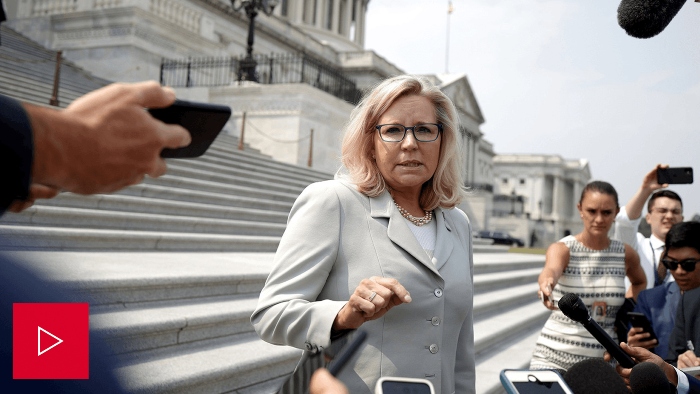| | | |  | BY MERIDITH MCGRAW | | YOU’RE FIRED — ICYMI, and how could you have, House Speaker Nancy Pelosi vetoed two Republican nominees — Rep. Jim Banks of Indiana and Rep. Jim Jordan of Ohio — from the bipartisan panel charged with investigating the deadly riots that erupted Jan. 6 on Capitol Hill. “The unprecedented nature of January 6th demands this unprecedented decision,” Pelosi said in a statement, pointing to the members’ “actions” and “statements.” Pelosi and House Minority Leader Kevin McCarthy, who responded by pulling all of his committee members from the panel, must each think they’re playing a winning hand. But two-party politics is a zero-sum game, so one of them must be playing from behind. Nightly’s instant take: This isn’t as bad for Pelosi as many are saying. Pelosi has an underappreciated asset in this scrum: the minority party’s “Never Trump” wing, who are often maligned by partisans on both sides, but who are also hellbent on making sure Republicans confront the facts of all that transpired on Jan. 6. Donald Trump’s insistence on remaining in his position as the de facto leader of the Republican Party has given the Never Trump movement a second wind and a new mission. And it has prolonged an intra-party debate that otherwise might have ended with the election of President Joe Biden.
| 
| There’s still a Republican on the committee, after all. Rep. Liz Cheney (R-Wyo.), who was kicked out of her high-ranking GOP post for pointing a finger at Trump’s actions leading up to Jan. 6 and secured a seat on the committee via Pelosi herself, said today she supported the decision to remove Banks and Jordan. She even said one of the two men might be a “material witness” to events leading up to the attack. Pelosi’s move shocked much of Washington, but many Democrats feel it was unavoidable. Among a sea of hardcore Trump supporters in the House, Banks and Jordan have proven to be some of the most outspoken and experienced in Trump-era partisan warfare. McCarthy’s decision to place the two men, who both voted against counting some of Biden’s electoral votes, on the committee showed that many Republicans view the investigation into Jan. 6 as nothing more than a chance to defend the former president against political attacks and continue their own attempts to spin the narrative about Jan. 6 on its head. In the months following the deadly riots, Trump and his allies began a campaign to change public perception of what happened on Capitol Hill that day. Lawmakers and aides on the Hill and reporters on the scene will tell you that even the harrowing scenes displayed on television didn’t capture the horror and violence that erupted as members of Congress tried to carry out their constitutional duty. Trump has tried to recast what unfolded up the street from him on Pennsylvania Avenue as an ordinary political protest held by “peaceful people,” “great people.” Trump has also begun to raise questions about the identity of the Capitol police officer who shot one of his supporters, Ashli Babbitt, an Air Force veteran and QAnon follower, as she and others tried to beat down doors that led to the Speaker’s Lobby near where members of Congress were hiding. A Trump adviser said the former president is just “raising questions” and that Babbitt’s death should be investigated. Certainly any death that happened because of violence within the halls of Congress that day should be investigated. But Trump’s recent focus on Babbitt has helped turn her into a martyr for the right and has shifted attention away from why she and others broke into the Capitol on Jan. 6 and what they aimed to do while they were inside. Trump and his allies want the public to view the Jan. 6 investigation as a “partisan political charade,” as Jordan said in a statement following Pelosi’s decision. Pelosi’s decision to pull Banks and Jordan off the committee in some ways helps their argument. And as GOP strategist Doug Heye pointed out in a tweet, one of the Democrats on the panel, Rep. Bennie Thompson of Mississippi, voted to object to the certification of Ohio’s electoral votes for George W. Bush back in 2005. So here we are, back to square one. McCarthy has said Republicans plan to pursue their own investigation. What began as a partisan attack on the Capitol — when Trump supporters rioted in the halls of Congress — will now officially be investigated twice, in a partisan manner. And one of McCarthy’s initial objections to a Jan. 6 committee — that a congressional investigation would be “duplicative” — will now come true. Members being rejected from a panel? Unusual. Congress doubling up work? Now that we’ve seen before. Welcome to POLITICO Nightly. Reach out with news, tips and ideas for us at nightly@politico.com. Or contact tonight’s author directly at mmcgraw@politico.com or @meridithmcgraw.
| |
A message from AARP: Americans are sick of paying the highest prices in the world for prescription drugs — more than three times what people in other countries pay for the same medicine. The President, members of Congress in both parties, and the people agree: we must cut drug prices. By giving Medicare the power to negotiate, we can save hundreds of billions of dollars. Tell Congress: Cut prescription drug prices now. | | | | | — Infrastructure vote fails as senators try to salvage bipartisan deal: Senate Republicans blocked moving forward on a bipartisan infrastructure bill that’s still being negotiated today . Members of the group insist they’re unbothered. The vote amounted to a setback to a key priority of President Joe Biden, although members of both parties expect at least one more try in the coming days. GOP centrists say they may be willing to provide the votes as early as Monday, when they think discussions will conclude. — Top general on Afghanistan: ‘I don’t think the end game is yet written’: The nation’s top general expressed confidence today in the Afghan security forces’ ability to fend off a takeover by the Taliban, despite significant gains by the group across the country and reports that Kabul could fall in a matter of months. “I don’t think the end game is yet written,” Gen. Mark Milley, chair of the Joint Chiefs of Staff, told reporters during a briefing at the Pentagon. “A negative outcome, a Taliban automatic takeover, is not a foregone conclusion.”
| |
| | SUBSCRIBE TO "THE RECAST" TODAY: Power is shifting in Washington and in communities across the country. More people are demanding a seat at the table, insisting that politics is personal and not all policy is equitable. The Recast is a twice-weekly newsletter that explores the changing power dynamics in Washington and breaks down how race and identity are recasting politics and policy in America. Get fresh insights, scoops and dispatches on this crucial intersection from across the country and hear critical new voices that challenge business as usual. Don't miss out, SUBSCRIBE . Thank you to our sponsor, Intel. | | | | | — Warren warns Biden administration on PPP fees: Sen. Elizabeth Warren is pressing the Biden administration to explain the extent to which accountants and lawyers who helped businesses receive aid under the Paycheck Protection Program may have been shortchanged for their services. Warren, in a June 14 letter to the Small Business Administration, obtained by POLITICO today, raised concerns about “contradictory guidance” from the agency that may have prevented businesses from receiving fees for helping employers file applications with banks for forgivable loans under the nearly $1 trillion rescue program. Warren’s office has not yet received a response from the SBA. The agency did not respond immediately to a request for comment on the letter. — Cash shortage threatens White House global vaccine effort: In an echo of World War II, the Biden White House announced last month that the United States would become an “arsenal of vaccines” — sending hundreds of millions of doses abroad to help save the world from Covid-19. Now that sweeping effort is in jeopardy, officials warn. The virus has killed more people worldwide already this year than it did in all of 2020. And, amid a bureaucratic battle with the White House, the agency charged with distributing the shots — the U.S. Agency for International Development — is scrambling to figure out how to pay for them.
| 
U.S. Secretary of Defense Lloyd Austin (L) and Chairman of Joint Chiefs of Staff Gen. Mark Milley (R) participate in a news briefing at the Pentagon. | Alex Wong/Getty Images | — Austin defends Milley following Trump book revelations: Defense Secretary Lloyd Austin today said he had “tremendous faith and confidence” in Milley after reports that the Joint Chiefs chair sought to prevent former President Donald Trump from perpetrating a coup in the aftermath of the 2020 election. “I’ve known the chairman for a long time. We’ve fought together. We’ve served a couple of times in the same units,” Austin told reporters at the Pentagon. “I’m not guessing at his character. He doesn’t have a political bone in his body.” — Biden diverges with Canada and extends border restrictions until at least Aug. 21: The Biden administration renewed its restrictions at the U.S.-Canada land border for at least another month, a move today that signals a new divergence between the neighbors in public-health policy at the frontier. The move comes a couple of days after the Trudeau government took the first steps to reopen the frontier to fully vaccinated, nonessential American travelers. — Opioid lawsuits on verge of settlements with 4 companies: The yearslong effort by state and local governments in the U.S. to force the pharmaceutical industry to help pay to fix a nationwide opioid addiction and overdose crisis took a major step forward Tuesday when lawyers for local governments announced they were on the verge of a $26 billion settlement with the nation’s three biggest drug distribution companies and the drugmaker Johnson & Johnson.
| |
| |  
| | | | | TURBOTAX FOR ALL — Nightly is interested in new ideas about politics and policy. In Idea Of The Day, we plan to surface fresh takes on longstanding or intractable issues. Tonight, we highlight University of Chicago law professor Daniel Hemel’s Twitter thread laying out a novel fix for the IRS’ Free File tax preparation system. Here’s a snippet:
| |
“A lightning-fast path to free user-friendly tax filing — the only path that could realistically be up & running by the 2022 filing season — would be for the federal government to pay online tax prep providers on a per-return basis for each return e-filed through their site” |
| Read the whole thread. If you have a unique policy idea or solution for us, send it our way at nightly@politico.com.
| | UKRAINIAN VISIT IN THE PIPELINE — Ukrainian President Volodymyr Zelensky will meet with Biden next month in Washington, the White House announced today. The news of Zelensky’s White House visit, scheduled for Aug. 30, comes at a delicate moment in the alliance between Washington and Kyiv, as the United States nears a deal with Germany on the controversial Nord Stream 2 pipeline. Ukraine has expressed concerns about the project, which would deliver inexpensive natural gas from Russia to Germany via a 764-mile-long pipeline under the Baltic Sea — potentially reducing Ukraine’s role in regional energy commerce. But Germany has argued the completion of Nord Stream 2 is vital to its energy security, and Russia views the pipeline as a means of expanding its influence across Europe while raking in revenue. Amid negotiations between Washington and Berlin over the project, U.S. officials have quietly urged their counterparts in Kyiv to refrain from public criticism of the potential pact — warning that such dissent could damage the Washington-Kyiv relationship. More on Nord Stream 2: Biden is also facing bipartisan backlash to his administration’s agreement with Germany that allows a Russian natural-gas pipeline to be completed. Congressional opponents argue that the deal is a boon to Moscow at the expense of Ukraine.
| |
| | SUBSCRIBE TO "THE RECAST" TODAY: Power is shifting in Washington and in communities across the country. More people are demanding a seat at the table, insisting that politics is personal and not all policy is equitable. The Recast is a twice-weekly newsletter that explores the changing power dynamics in Washington and breaks down how race and identity are recasting politics and policy in America. Get fresh insights, scoops and dispatches on this crucial intersection from across the country and hear critical new voices that challenge business as usual. Don't miss out, SUBSCRIBE . Thank you to our sponsor, Intel. | | | | | | | | |
| | | | 
Yul Moldauer of Team United States on the rings during a practice session at the Ariake Gymnastics Centre ahead of the Tokyo 2020 Olympic Games. | Harry How/Getty Images | TOKYO’S BIG EXPERIMENT — At these Olympic Games, Ryan Heath writes, nothing is off the table, even the possibility of a last-minute cancellation. Every Olympic Games has its protest crowd, loudest in the days and weeks before the Opening Ceremonies: They argue the Games are an elite, expensive endeavor, diverting attention and money from better causes. But as the Games roll on, the protest noise tends to fade, replaced by tales and images of athletic heroism. In Rio de Janeiro (2016) the gloss of the Olympics was juxtaposed against Brazil’s wrenching poverty and the city’s millions of slum dwellers. In Beijing (2008) concern centered on the Communist regime’s human rights abuses. Ahead of the Los Angeles Games (1984), it was suggested athletes could die competing in the smog. The difference with Tokyo 2021 is that the global nature of Covid-19 means mistakes in Japan could turn the whole world into a victim of the Olympic Games.
| |
A message from AARP: It’s outrageous that Americans pay more than three times what people in other countries pay for the same medicine. And these unfair prices keep going up. Even during the pandemic and financial crisis, the prices of more than 1,000 drugs were increased. It’s time for the President and Congress to cut prescription drug prices.
Currently, Medicare is prohibited by law from using its buying power to negotiate with drug companies to get lower prices for people. This must change. Giving Medicare the power to negotiate will save hundreds of billions of dollars.
And the American people agree. In a recent AARP survey of Americans 50+, a vast majority supported allowing Medicare to negotiate with drug companies for lower prices, including 88% of Democrats and 85% of Republicans.
Tell Congress: Act now to lower prescription drug prices. Let Medicare negotiate. | | | Did someone forward this email to you? Sign up here. | |
|
| | Follow us on Twitter | | | FOLLOW US
|
| |

No comments:
Post a Comment